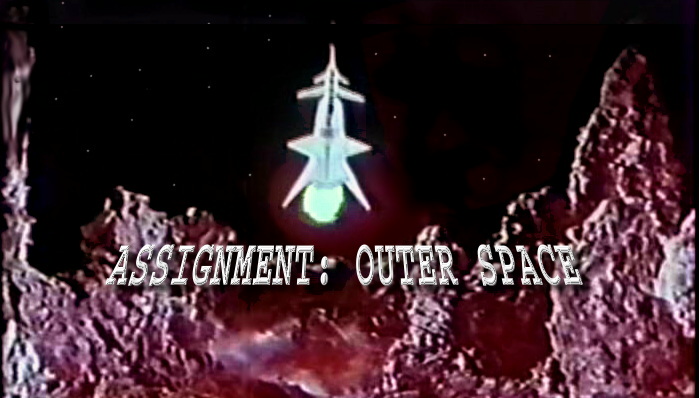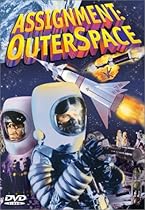 For kids growing up in the 1960s, the very idea of space travel was still novel and exciting. It hadn’t become a matter of course, even in the movies and on TV. Films like ASSIGNMENT: OUTER SPACE (aka SPACE MEN) could capture the imaginations of young science fiction fans, without expectations of high budgets or seamless effects.
For kids growing up in the 1960s, the very idea of space travel was still novel and exciting. It hadn’t become a matter of course, even in the movies and on TV. Films like ASSIGNMENT: OUTER SPACE (aka SPACE MEN) could capture the imaginations of young science fiction fans, without expectations of high budgets or seamless effects.
In 2116 Ray Peterson (Rik Van Nutter, Felix Leiter in THUNDERBALL), reporter for the Interplanetary Chronicle of New York, is assigned to a space station, sent up with rocket BZ88. Though he’s been to the moon several times, he’s never been in deep space, and finds the rocket crews and especially the Commander (David Montresor) resent his presence. Even the dryly amiable veteran space man Al (Archie Savage) calls him a leech; a useless drain on always strained resources.
Defying orders, Peterson goes EVA, and saves an astronaut from being killer by a stray meteor. However, his clumsiness detaches a refueling line, and hundreds of gallons of hydrazine fuel are lost.

The crewman he saved happens to be the station’s only female, Lucy (Gabriella Farinon) and inevitably, a romance develops, even though she’s at least somewhat emotionally engaged with the seemingly ever-grim Commander—whose name is George, if only to her.
The slow-paced plot starts to pick up, with the planned rescue of a Mars Rocket—though only one man who bailed out onto the surface of the moon Phobos (and somehow survived the impact) is ultimately saved.
Then the BZ88 must zoom out to Venus —which, oddly enough, has an atmosphere that doesn’t crush their ships and base like tinfoil and instantly roast them alive. (Though to be fair, in 1960 even some reputable scientists were holding out some slim hopes that Venus might be a more hospitable place than it proved to be in reality. The dream of a second Earth dies hard.)
It seems the experimental Alpha 2 ship’s pilot has died and the photonic drive, locked in computer control and emiting a deadly field, will eventually destroy the Earth. Several noble self-sacrifices follow, and the reporter finally proves his worth in dramatic fashion.

ASSIGNMENT: OUTER SPACE was apparently Italian director Antonio Margheriti’s first film as a solo effort. (Credited as Antony Daisies in Italy and Anthony Dawson on the US Dub.)
He’d go on to direct many science fiction and horror films, including WAR OF THE PLANETS (1966), CASTLE OF BLOOD (1964), THE LONG HAIR OF DEATH (1964), as well as peplum such as HERCULES, PRISIONER OF EVIL (1966), often as “Anthony M. Dawson”. YOR, HUNTER FROM THE FUTURE (1983) would combine all three genres.
Co-writing the script for “SPACE MEN” with Ennio De Concini (credited together as ‘Vassilji Petrov’ on the U.S. print), Margheriti came up with ingenious ways to make the SF film on a budget reported (by his son Edoardo — see LINK) to be under $30,000 American dollars.
Like many an amateur filmmaker (and time & budget-pressed pro) for some of the effects, he used commercially available model kits of spacecraft designed by Werner Von Braun and Willy Ley. Von Braun’s ‘3-Stage Ferry Rocket’ is used for the ‘hero’ ship, the BZ88, the Mars ship is the skeletal ‘U.S. Moon Ship’, and the old atomic rocket used by spaceman Al seems to be based on or modified from the ‘RM-1 Lunar Recon Vehicle’. (These kits were made by Lindberg and Strombecker in U.S. during the mid to late `50’s and continued to be available until the `70’s.)

Today, the film would seem to most people a slow-moving and absurdly cheap and hokey piece of cinematic history. One of the explosions in the film, supposed to be on the surface of Mars, is actually a quick shot of an explosion in an alley or parking lot, with the rear of a car visible.
It’s not STAR TREK, it’s not even MAN INTO SPACE—or LOST IN SPACE, for those too young to remember the B&W M.I.S.
The English-language dialog, credited to “Jack Wallace”, is often awkward and perhaps loses something essential in its attempted philosophical points through the translation/lip synch process. I suspect the narration also introduces some non-sequitor referrences to intergalactic travel rather than the film’s actual setting in our solar system.

Yet viewed through my admittedly biased eyes, it still entertains. It’s very much like a 1930’s-50’s pulp space opera tale, complete with the “surprise” female astronaut. It’s also slightly ahead of its time. Suspended animation is used for the first leg of the trip from Earth, possibly one of the first occurrences of the idea in a sci-fi film.
The likable and highly competent character Al is played by a black actor, and no mention of his race is made at all. Nor should it be, in 2116.
Ideas of alienation and depersonalization are introduced; the space crew has literally forgotten that it’s Christmas, at one point. Often they refer to themselves and others by their suit numbers. I don’t think we learn anybody but our hero’s first and last name. However, these are largely just clever devices, not really resonating profoundly—and they’re acknowledged by the space men as not being the ‘right’ attitudes by the end of the film.
Worth seeing for those who are willing to put aside most of their critical faculties in favor of a child-like, but not necessarily childish sense of wonder.
Laughing at it with yout pals over pizza and beer might just work, too.
As the film has fallen into the public domain, most DVDs have very faded color and mushy contrast, likely all from the same scratched print source. The bare-bones Digiview Entertainment DVD I viewed seems to have been transfered from a video master, with some skewing visible on the bottom of the frame.
Released in the U.S. in 1961 by A.I.P., the film appeared in many markets as a triple bill with FIRST SPACESIP ON VENUS (1960) and THE MYSTERIANS (1957). It was ‘presented’ by Fred Gebhardt (THE PHANTOM PLANET, 12 TO THE MOON), with editor/dubbing director Hugo Grimaldi (THE HUMAN DUPLICATORS) credited as producer.

ASSIGNMENT: OUTER SPACE (1960). Directed by: Anthony Dawson (Antonio Margheriti). Screenplay by: Vassily Petrov (Ennio De Concini & Antonio Margheriti .Cinematography by: Marcello Masciocchi. Produced by: Turi Vasile and Goffredo Lombardo for Titanus Appia Studios. American Version: Fred Gebhardt Presents a Four Crown Project, Produced by Hugo Grimaldi. ‘Narration’ by: Jack Wallace. Music: Gordon Zahler (Library Tracks edited by Ted Roberts, according to IMDB.) Running Time: apx. 79 minutes. Cast: Rick Van Nutter, Gaby Farinon, David Montresor, Archie Savage, Alain Dijon.
[serialposts]